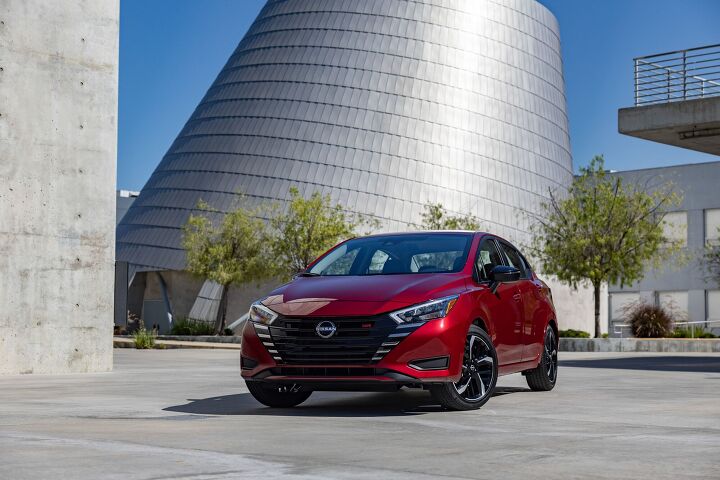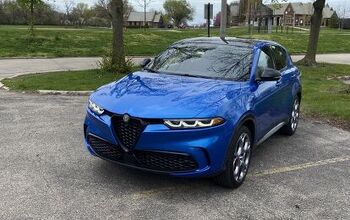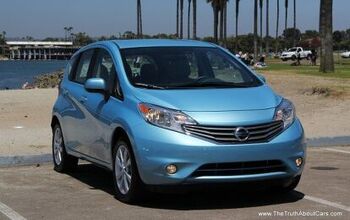Drive Notes: 2024 Nissan Versa SR

The high cost of new cars is often bemoaned by consumers and keyboard warriors such as us alike. Sticker prices are high these days, no doubt. Enter the 2024 Nissan Versa -- a potentially decent set of wheels for under $25K.
Is the Versa a good entry-level ride or a penalty box?
Read on.
Overall, the package is pleasant, but there are some cons. First, however, the highlights.
Pros
- Apple CarPlay is available, though wired. So is satellite radio and heated seats. These are popular features and it's nice to not give them up even at this price point.
- The car handles better than one would expect. Not sporty, precisely, but it's not somnolent.
- Trunk space is plentiful.
- I like the styling inside and out.
- On a MPG basis, fuel economy is excellent. There's a caveat, however. See below.
- Knobs! Buttons! An easy-to-learn-quickly infotainment system! Thank you, Nissan.
Cons
- The engine is a bit too noisy under load or when pushed -- and you'll be pushing it a lot. There's only 122 horsepower and 114 lb-ft of torque from the 1.6-liter four-pot, and that lack of guts is felt.
- The CVT is whiny and obnoxious. It's also too easy to accidentally select "L" instead of "Drive".
- The ride is a tad too stiff at times.
- The infotainment screen is small, and so is the center console.
- Interior materials don't feel quality -- there are too many hard plastics inside.
- I wished for more info from the gauge cluster. You can set up a tach but if you could bring forth other basic gauges, I couldn't figure it out.
- While the MPG numbers are great, the range stunk, presumably due to a small fuel tank.
- It didn't matter in terms of braking performance, as far as I could tell, but the rear brakes are drums. In the year 2024.
That sounds like a lot of cons, but remember, the price here is $22K and change. I'll point this out when the full review is written, but you do expect to make some tradeoffs when buying one of the least-expensive cars on the market. If you can live with some roughness around the edges and some powertrain woes, the Versa gets you some basic creature comforts. Some people just need basic transport, and while you could stretch your dollar and bring home a much-nicer Honda Civic, the Versa will suffice for those who want/need to spend as little as possible.
[Images: Nissan]
Become a TTAC insider. Get the latest news, features, TTAC takes, and everything else that gets to the truth about cars first by subscribing to our newsletter.

Tim Healey grew up around the auto-parts business and has always had a love for cars — his parents joke his first word was “‘Vette”. Despite this, he wanted to pursue a career in sports writing but he ended up falling semi-accidentally into the automotive-journalism industry, first at Consumer Guide Automotive and later at Web2Carz.com. He also worked as an industry analyst at Mintel Group and freelanced for About.com, CarFax, Vehix.com, High Gear Media, Torque News, FutureCar.com, Cars.com, among others, and of course Vertical Scope sites such as AutoGuide.com, Off-Road.com, and HybridCars.com. He’s an urbanite and as such, doesn’t need a daily driver, but if he had one, it would be compact, sporty, and have a manual transmission.
More by Tim Healey
Latest Car Reviews
Read moreLatest Product Reviews
Read moreRecent Comments
- W Conrad I'm not afraid of them, but they aren't needed for everyone or everywhere. Long haul and highway driving sure, but in the city, nope.
- Jalop1991 In a manner similar to PHEV being the correct answer, I declare RPVs to be the correct answer here.We're doing it with certain aircraft; why not with cars on the ground, using hardware and tools like Telsa's "FSD" or GM's "SuperCruise" as the base?Take the local Uber driver out of the car, and put him in a professional centralized environment from where he drives me around. The system and the individual car can have awareness as well as gates, but he's responsible for the driving.Put the tech into my car, and let me buy it as needed. I need someone else to drive me home; hit the button and voila, I've hired a driver for the moment. I don't want to drive 11 hours to my vacation spot; hire the remote pilot for that. When I get there, I have my car and he's still at his normal location, piloting cars for other people.The system would allow for driver rest period, like what's required for truckers, so I might end up with multiple people driving me to the coast. I don't care. And they don't have to be physically with me, therefore they can be way cheaper.Charge taxi-type per-mile rates. For long drives, offer per-trip rates. Offer subscriptions, including miles/hours. Whatever.(And for grins, dress the remote pilots all as Johnnie.)Start this out with big rigs. Take the trucker away from the long haul driving, and let him be there for emergencies and the short haul parts of the trip.And in a manner similar to PHEVs being discredited, I fully expect to be razzed for this brilliant idea (not unlike how Alan Kay wasn't recognized until many many years later for his Dynabook vision).
- B-BodyBuick84 Not afraid of AV's as I highly doubt they will ever be %100 viable for our roads. Stop-and-go downtown city or rush hour highway traffic? I can see that, but otherwise there's simply too many variables. Bad weather conditions, faded road lines or markings, reflective surfaces with glare, etc. There's also the issue of cultural norms. About a decade ago there was actually an online test called 'The Morality Machine' one could do online where you were in control of an AV and choose what action to take when a crash was inevitable. I think something like 2.5 million people across the world participated? For example, do you hit and most likely kill the elderly couple strolling across the crosswalk or crash the vehicle into a cement barrier and almost certainly cause the death of the vehicle occupants? What if it's a parent and child? In N. America 98% of people choose to hit the elderly couple and save themselves while in Asia, the exact opposite happened where 98% choose to hit the parent and child. Why? Cultural differences. Asia puts a lot of emphasis on respecting their elderly while N. America has a culture of 'save/ protect the children'. Are these AV's going to respect that culture? Is a VW Jetta or Buick Envision AV going to have different programming depending on whether it's sold in Canada or Taiwan? how's that going to effect legislation and legal battles when a crash inevitibly does happen? These are the true barriers to mass AV adoption, and in the 10 years since that test came out, there has been zero answers or progress on this matter. So no, I'm not afraid of AV's simply because with the exception of a few specific situations, most avenues are going to prove to be a dead-end for automakers.
- Mike Bradley Autonomous cars were developed in Silicon Valley. For new products there, the standard business plan is to put a barely-functioning product on the market right away and wait for the early-adopter customers to find the flaws. That's exactly what's happened. Detroit's plan is pretty much the opposite, but Detroit isn't developing this product. That's why dealers, for instance, haven't been trained in the cars.
- Dartman https://apnews.com/article/artificial-intelligence-fighter-jets-air-force-6a1100c96a73ca9b7f41cbd6a2753fdaAutonomous/Ai is here now. The question is implementation and acceptance.




































Comments
Join the conversation
have the Versa S 2023, was getting 30 miles to the gallon, now the engine at 6000 miles getting 37 mpg. about 400 miles per fill, leaves you with 50 60 miles to spare. What is the range on a Tesla?
I don't get the nissan hate. Yeah, a lot of their owners are credit criminals and it definitely dogs the brand, but the cars themselves are very solid. The way people talk about Nissan being junk you'd swear they were making crap akin to GM or Ford. They're not Honda or Toyota but they aren't that far off, and they're leagues ahead of Hyundai/Kia, VW, or even Subaru.
As for the versa this is a fairly good car at a reasonable price, particularly with the manual.
I also don't understand why people complain about hard plastics. As long as the armrests are padded, who cars? The owners will appreciate it doesn't disintegrate into pockmarked foam in 4 years or the headliner doesn't require a 4 figure replacement by the time it's paid off.